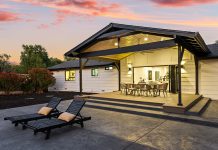Ten years ago, the Healdsburg Unified School District (HUSD) became a community funded district, meaning that local property taxes are our primary source of revenue. This funding model, often referred to as Basic Aid, is different from the funding model of most school districts in California, which are funded on a per student basis by the state.
This state funded model is how most of our neighboring districts such as Windsor, Cloverdale, Santa Rosa, and Petaluma are funded. In Healdsburg, the revenue for our schools is primarily generated from property taxes, and is not tied to the number of students served by the district. We believe it important that our community understands the community funded model and the clear advantages it provides.
First, the transition to being community funded (or Basic Aid) is not optional. The state requires districts to become community funded as soon as that model brings more revenue into the schools than the state funding model. Thus, in 2008, HUSD was mandated to adopt this funding model.
Second, the HUSD Board of Trustees, as a community funded district, decided that Healdsburg’s tax revenue should be spent on the children residing in Healdsburg. The board strictly limited enrollment to students who reside within the district’s boundaries. The overarching belief is that Healdsburg’s monies should be spent on Healdsburg’s children.
Furthermore, tax revenues are augmented by the generous support of the Healdsburg Educational Foundation, which works with our community to secure funding for innovative programs that offer even more opportunity for our students. Any students transferring from outside our district would not bring additional funding and would essentially be subsidized by our community, leaving less funds to be spent per student.
Third, our community funding provides our students with access to more robust programs and services. HUSD revenues equate to about $16,000 per student, as compared to $11,000 or less per student in other Sonoma County school districts.
These additional revenues have enabled us to offer more services and supports to our students. For example, both Healdsburg High School and Healdsburg Junior High have seven-period schedules, offering students the opportunity to access more electives, academic interventions and enrichment courses.
We have a full time counselor at HJH and two at HHS, allowing for smaller than typical caseloads and increased access to services. Finally, every student in grades 6–12 is provided with a Chromebook that is used at both school and home, changing the learning paradigm for all students to hone their creativity and critical thinking skills in the age of information.
Our elementary schools enjoy the services of a full time psychologist, who provides valuable early intervention for struggling students. Furthermore, all of our elementary students access a wide range of enrichment programs including music, chess, STEM and art education.
Our elementary schools have an array of intervention opportunities and boast at least a 2:1 Chromebook to student ratio. Finally, all grades in our elementary school have lower class sizes than most public elementary schools in Sonoma County. These are just a few of the additional services and supports that students of HUSD receive as a result of higher than average per pupil spending.
Another advantage of our revenue model is the ability to attract and retain our team of highly skilled educators. While we recognize there is still more work to do on compensation, we have been able to provide over 20 percent in compensation increases over the last seven years. As a result, we have an incredible staff that is firmly committed to our students’ success.
Most, if not all of the things listed above, would not be possible if HUSD were not a community funded district. We simply would not have enough revenue to offer all of these opportunities for our students. If one looks to neighboring public schools, you may find one or two similar programs, but not all of them. Simply put, our students have access to more personalized, relevant, supportive and engaging programs.
In order to maximize tax dollars’ effect on Healdsburg students’ education, we have followed a strict residency requirement in the district. Over the years, however, we’ve seen families steadily leave the community as a result of the high housing costs. This winter and spring, we will begin to discuss the possibility of changing the board policy on inter-district transfers.
While we know that revenues are not tied to the number of students enrolled, we do recognize the need to have enough students to offer a wide range of programs and services. Our community funded schools provide undeniable advantages to the children of Healdsburg. As we discuss the possibility of opening our schools to students from outside Healdsburg, we will do so carefully to ensure that we don’t compromise the high quality educational programs our children enjoy.
Chris Vanden Heuvel is the superintendent of the Healdsburg Unified School District. Judy Velasquez is the board of trustees president and Jami Kiff is the vice president.








